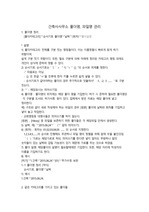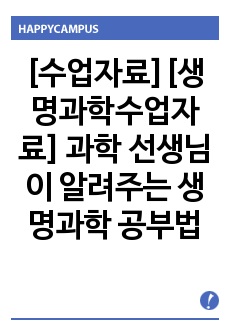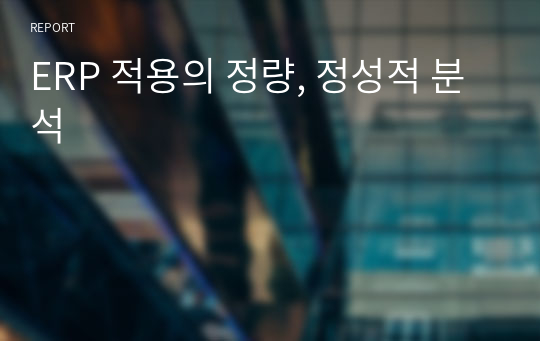ERP 적용의 정량, 정성적 분석
continue34
다운로드
장바구니
소개글
"ERP 적용의 정량, 정성적 분석"에 대한 내용입니다.목차
1. Introduction1.1. Background and purpose
1.2. Method and scope
2. Theoretical background
2.1. Definition of ERP system
2.2. ERP development process
2.3. Characteristics of ERP
2.3.1. Integrated management system
2.3.2. Business Process Reengineering (BPR) support
2.3.3. User-oriented system
2.3.4. Executive Information System (EIS) service
3. Research plan and method
3.1. Research hypotheses
3.1.1. Quantitative performance variables
3.1.2. Qualitative performance variables
3.2. Sample selection
3.3. Variable selection
3.3.1. Quantitative performance variables
3.3.2. Qualitative performance variables
4. Analysis of hypotheses testing
4.1. Hypotheses verification of quantitative performance
4.2. Hypotheses verification of qualitative performance
5. Conclusion
REFERENCE
APPENDIX∙: The questionnaire
본문내용
The survival of businesses highly relies on adequate responses to external environments to fulfil customer demand and capability to enhance production efficiency. In other words, high quality products with competitive prices can lead to customer satisfaction which eventually leads to sustainability and stability of businesses. To reflect this trend, most businesses started to apply Enterprise Resource Planning (EPR) system to their workplaces during the 1990s (Dacenport, 1998).By the 1990s, Korean companies began to install ERP systems to keep up with changes of business environments. The background of the move was that many changes were effected in Korean business environments. First of all, International Monetary Fund (IMF) cold wave came to Korea in 1997. It dramatically accelerated opening domestic markets to overseas companies and Korean companies actively expanded their businesses into foreign countries. Also, the Korean faced various economic arguments.
참고 자료
Choi, G.S. (2007) ERP implementation method for small or medium sized business. Thesis(MA) DM325.431-7-203=2. Chonnam National University.Davenport, T.H. (1998) Putting the Enterprise into the Enterprise System. Harvard Business Review. 76(4) pp.121-131.
Hammer, M. & Champy, J. (1993) Reengineering the corporation: A manifesto for business revolution. New York: HarperBusiness
Han, J.W. (2012) A study of the effects of ERP system: Focusing on automotive industry case. Thesis(MA). 657 -12-102. Kyungpook National University.
Keller, E. (1994) ERP key issues: Definning the new environment. CIM by GartnerGroup Key issues.
Kim, C.S. (2006) The effects of ERP introduction on business finance performance. Thesis(MA) DM325.9-6-139=2. Chonnam National University.
Kim, G.S. (2014) ERP information administrator. Seoul: A&T
Park, H.C. (2010) A study of the effects of ERP on financial performances. Thesis(MA). 421-1-354. Kyungpook National University.
Park, S.E. (2000) The research on the effects of ERP system introduction on improvement in timeliness of financial reporting. Thesis(MA). HI07-7585689. Hongik University.
Wylie, L. (1990) A vision of next generation MRPⅡ, Scenario S-300-339, Gartner Grouop



























